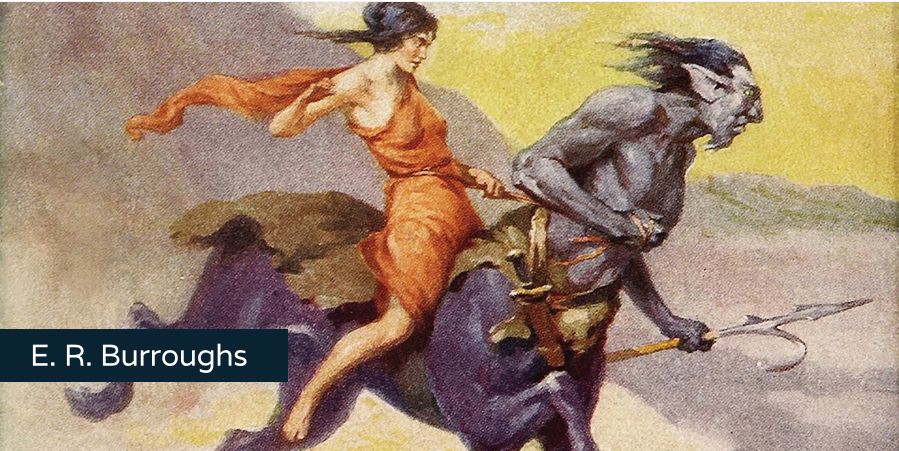My introduction to the University of Nebraska Press (2002) edition of Edgar Rice Burroughs’ The Moon Maid.
IT WAS, I believe, Harlan Ellison who pointed out, with not inconsiderable pride, that easily half of the most enduring fictional characters in modern culture have come to us from genre literature. Thus we have strutting across our stage with the likes of Hamlet, Elizabeth Bennett and Madame Bovary—Frankenstein, Superman, Sherlock Holmes, and Edgar Rice Burroughs’s immortal creation, Tarzan.
Any author who has made such an indelible mark on the human imagination needs little introduction and less apology. Had he written nothing else, Burroughs’s place in cultural (not to say literary) history would be secure. But of course he did. Write much else, that is.
 Edgar Rice Burroughs had failed in his ambition to become either a cavalryman or a gold prospector when he picked up the pen in the early decades of the twentieth century and began the astonishing career that was to make him one of the world’s most popular, if least respected, authors.
Edgar Rice Burroughs had failed in his ambition to become either a cavalryman or a gold prospector when he picked up the pen in the early decades of the twentieth century and began the astonishing career that was to make him one of the world’s most popular, if least respected, authors.
The early success of both A Princess of Mars and Tarzan of the Apes led to his production of a torrent of tales—some ninety narratives in all—whose settings, all wildly exotic, ranged from unexplored Africa and Mars to the center of the Earth (Pellucidar), from the steaming jungles of Venus to, what then seemed implausible, the hollow core of the Moon.
Many of these books were sequels to and embellishments of Burroughs’s earlier successes. All were written at a dead run, and most were serialized in pulp magazines like Argosy, All-Story Weekly, and Blue Book. They are cliffhangers in which “only the cliffs change,” as Brian Aldiss has astutely observed: repetitive, picaresque tales of nonstop adventure based on adolescent fantasies of constrained eroticism and unrestrained power.
The Moon Maid, The Moon Men, and The Red Hawk came rather late in the author’s career (the mid-I920s), after Mars had been done to death but before he began writing his last series, set on Venus. The themes are familiar: capture and escape, cruelty and honor, virginity and lust. One senses that the plots have begun to lose their appeal even to their persistent creator. Though the action is fast, it is less than furious.
Connected strictly by character (one of which is reincarnated from one generation to the next), and loosely by plot, these three novels, combined here in one volume, cover some five hundred years of future history, in which the earth is conquered by humorless invaders from the Moon.
The trilogy’s sequence of events begins in The Moon Maid, when a ship bound for Mars is crashed on the Moon as a result of the treacheries of an evil officer-engineer, Orthis. The ship’s captain, Julian 5th, is captured by the Va-gas, a bestial centaur race, but he escapes with a beautiful fellow captive, Nah-ee-lah, and throws in with her people, the aristocratic but doomed Laytheans.
Alas, their escape is to no avail. Orthis has armed the Laytheans’ former subjects, the resentful, vaguely proletarian and half-educated Kalkars (“those who thought that they thought”) with weapons that allow them to obliterate Laythe and prepare for an invasion of Earth.
The Moon Men cuts to four generations later. A war-weary and disarmed Earth (the book was written in the aftermath of World War I) was easy pickings. Julian 8th, the descendant of Julian 5th and Nah-ee-lah (the Moon Maid), is a slave in a Kalkar-ruled Chicago. Julian 8th rebels and, with a plucky female at his side, begins to organize his fellow “Yanks” to fight back. The Moon Men reads like a 1930s labor saga, except the enemy is not management but a naive, leveling collectivism which “would make all women the property of all men.” For Burroughs, who thought each man was entitled to his own, this notion was the ultimate infamy.
By the time of The Red Hawk the rebels have been fighting for generations, under the leadership of Julian 8th’s descendants. Armed with bows and adorned in warpaint, the “desert Yanks” resemble twenty-fifth-century white Indians, except for their flag of stars and stripes. (The real Indians, meanwhile, are docile, dusky slaves.) Under Julian l0th (Red Hawk) the rebels strike west and retake California in a sea of blood. The descendants of both Julian and Orthis (now Or-tis) unite at last against the Kalkars and their “half-breed” progeny. But the world they rule has been reduced to barbarism.
The action of the three-part story is told through a flimsy framing tale, which even includes a scene on the arctic ice a la Frankenstein. It is formulaic stuff and the formula is worn thin. These three are not the author’s best books, and even his best rarely rise above the level of pulp.
But it is not my intention to enumerate Burroughs’s literary sins or to echo his detractors. He never aspired to critical success; his innumerable readers are the proof of his pudding. I intend only to affirm the particular importance of these three books, which were instrumental in establishing his now-unassailable reputation as the Father of Modern Science Fiction.
He was not always considered so.
It is difficult for today’s reader to understand that in the last century Burroughs was considered a fantasist, not a respectable science fiction author. Though his stories took place on other planets, their settings were seen as fanciful, improbable, and even absurd.
Such a view was commonly held before the recent triumphant return of the Singapore—Philip Morris lunar interior mapping expedition, which overturned two centuries of obfuscatory Eurocentric pseudo-science and confirmed that the Moon actually is a hollow sphere filled with bestial half-humans lusting after the Earth and its women.
To say that this startling but now irrefutable discovery revolutionized planetary science is to belabor the obvious; it altered the literary canon as well, placing Edgar Rice Burroughs at the head of that small but precious coterie of speculative geniuses whose imaginary worlds are prescient reflections of real futures.
He alone understood. And he alone had the courage to address, in prophecy thinly disguised as fiction, the tragedy that awaited unsuspecting humankind. That the Kalkars were destined to outgrow the Moon and cast an envious eye upon our planet, one can unfortunately no longer doubt. That they found Earth to their liking we all now know, to our sorrow. It is only in the incidental details of his future history that Burroughs can be faulted. But what he missed, we all missed. Who among us would have guessed that the cruel Kalkars’ ultimate goal was not absolute world domination or total human enslavement, but rather, and rather simply, control of the university presses?
Thanks for your interest in my work. If you enjoyed this little piece, please give a dollar to a homeless person.)

